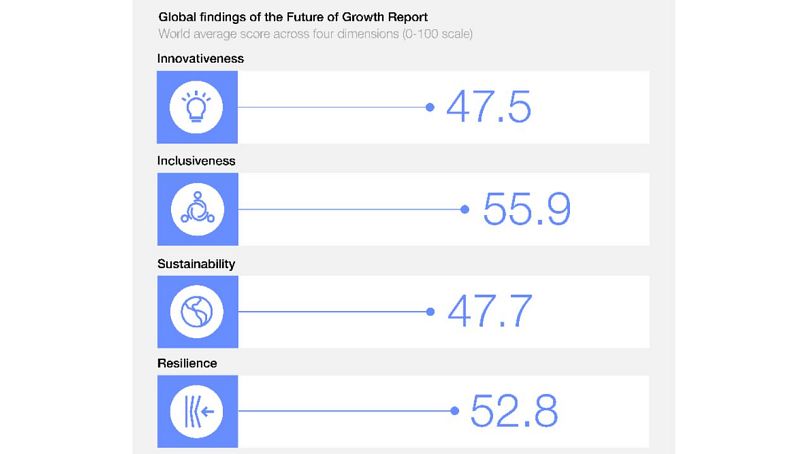A new report from the WEF claims that a conventional GDP growth picture is incomplete without a deeper understanding of the underlying nature and quality of growth.
The world's economic slowdown is due to fall to its lowest rate in three decades by 2030, amid ongoing economic and geopolitical shocks, according to a new study.
Interweaving global challenges, such as the climate crisis and a weakening social contract, will collectively worsen the impact of the economic slump, slowing down progress in global development, said the World Economic Forum (WEF) in a report published on Wednesday.
But rather than measure growth in terms of typical GDP analysis, the report looked at the "underlying nature and quality of the growth" in various countries based on four main areas: innovativeness, inclusiveness, sustainability and resilience.
Global analysis
The report found that on average, countries' economies scored highest in inclusiveness (how much they benefit and create opportunities for everyone) and resilience (how well they can withstand and recover from shocks).
Specifically, countries on average scored 55.9 out of 100 for inclusiveness and 52.8 for resilience.
Nevertheless, the report highlights that many countries are still growing in ways that are not sustainable or inclusive, due to challenges in adopting innovation and minimising their susceptibility to global shocks.
Meanwhile, the average global score for sustainability, evaluating how well an economy can stay within environmental limits, is 46.8 out of 100.
Countries scored on average the worst in innovativeness (measuring how well an economy can adapt to new developments for long-term growth improvement) as it came in at 45.2 out of 100.
Three European countries come in high on sustainability
Among the 107 economies covered by the report, none of the countries scored higher than 80 on any of the four dimensions.
High-income countries recorded an average GDP of $52,475 (€48.350) per capita (at purchasing power parity) in 2023. Between 2018 and 2023 they experienced an average annual GDP per capita growth of 1.01%.
These countries' growth pattern tends to be marked by high scores in inclusiveness (68.9), innovativeness (59.4), and resilience (61.9), according to the WEF report, but were let down in terms of sustainability (45.8).
Countries in this category include Australia, Canada, France, Germany, Italy, Japan, Saudi Arabia, South Korea, the UK and the US.
More specifically, the likes of Switzerland (80.4), Singapore (76.4), and the US (74.1) scored best for innovativeness; Finland (77.7) and Canada (75.8) for inclusiveness; Sweden (60.9), Germany (56.3), and the UK (54.0) for sustainability; and Australia (69.5) and Japan (66.3) for resilience.
The WEF noted that common challenges preventing a more robust and balanced growth performance in this group include issues like the availability of talent, access to equal workplace opportunities, slow adoption of green technologies, and a lack of reskilling and lifelong learning opportunities.
The report also examines lower-middle-income economies with an average GDP per capita of $7,633 (€7032) in 2023.
Over the past five years, these economies focused on resilience, outperforming richer ones in sustainability but needing improvement in inclusiveness and innovativeness.
Countries like Bangladesh, Egypt, India, Nigeria, Pakistan, the Philippines, and Vietnam face challenges in technology, social safety nets, renewable energy, and healthcare.
Similarly, low-income economies, averaging $1,533 (€1412) per capita in 2023, show a lighter environmental footprint with a strong sustainability emphasis. However, there's room for improvement in resilience, inclusiveness, and innovativeness.
Challenges for them include information and communication technology (ICT), connectivity, nutrition, environmental regulation, and energy source diversification. For example, Rwanda excels in resilience but faces challenges in areas like ICT and energy, according to the report.
The future ahead
Many countries are still growing in ways that are not sustainable or inclusive, according to the report, as they struggle to foster innovation for the future and are at risk from global challenges.
While the focus has rightly gone into addressing short-term challenges, it is now crucial to focus attention on the medium-and long-term horizons, the report said, with a "need to preserve what has been achieved and shape a better tomorrow."
"The future of growth must shift to a better balance between quantity and quality. A simple “return” to GDP growth is not enough," Saadia Zahidi, managing director at the WEF, said in the report.
"Instead, each country must undertake a unique and complex journey towards achieving innovative, inclusive, sustainable and resilient growth, while contributing to global resilience."












